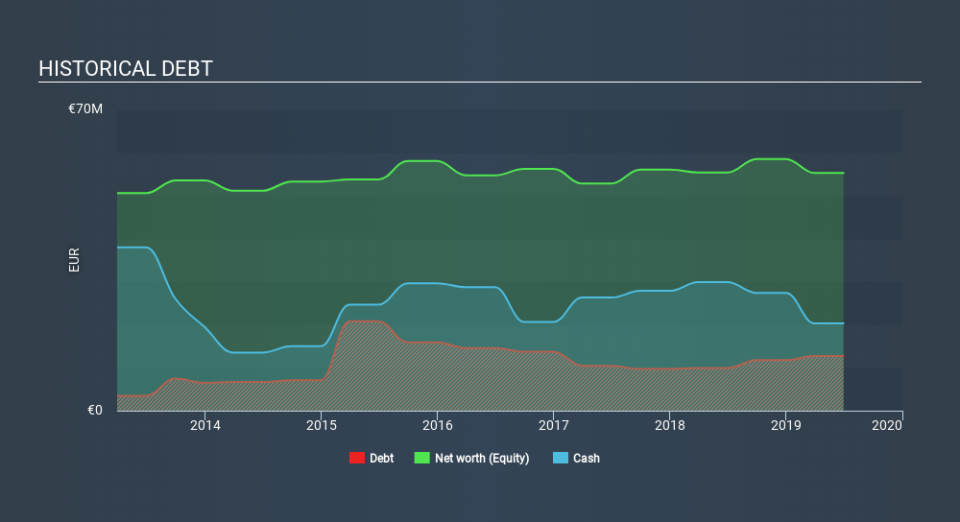NSC Groupe (EPA:ALNSC) Takes On Some Risk With Its Use Of Debt

Warren Buffett famously said, 'Volatility is far from synonymous with risk.' So it might be obvious that you need to consider debt, when you think about how risky any given stock is, because too much debt can sink a company. We note that NSC Groupe SA (EPA:ALNSC) does have debt on its balance sheet. But should shareholders be worried about its use of debt?
When Is Debt A Problem?
Debt assists a business until the business has trouble paying it off, either with new capital or with free cash flow. Ultimately, if the company can't fulfill its legal obligations to repay debt, shareholders could walk away with nothing. However, a more common (but still painful) scenario is that it has to raise new equity capital at a low price, thus permanently diluting shareholders. By replacing dilution, though, debt can be an extremely good tool for businesses that need capital to invest in growth at high rates of return. The first step when considering a company's debt levels is to consider its cash and debt together.
Check out our latest analysis for NSC Groupe
What Is NSC Groupe's Debt?
The image below, which you can click on for greater detail, shows that at June 2019 NSC Groupe had debt of €12.7m, up from €9.90m in one year. But on the other hand it also has €20.3m in cash, leading to a €7.58m net cash position.
A Look At NSC Groupe's Liabilities
We can see from the most recent balance sheet that NSC Groupe had liabilities of €37.1m falling due within a year, and liabilities of €13.9m due beyond that. Offsetting these obligations, it had cash of €20.3m as well as receivables valued at €24.2m due within 12 months. So its liabilities total €6.50m more than the combination of its cash and short-term receivables.
Since publicly traded NSC Groupe shares are worth a total of €32.5m, it seems unlikely that this level of liabilities would be a major threat. Having said that, it's clear that we should continue to monitor its balance sheet, lest it change for the worse. Despite its noteworthy liabilities, NSC Groupe boasts net cash, so it's fair to say it does not have a heavy debt load!
In fact NSC Groupe's saving grace is its low debt levels, because its EBIT has tanked 32% in the last twelve months. When it comes to paying off debt, falling earnings are no more useful than sugary sodas are for your health. There's no doubt that we learn most about debt from the balance sheet. But it is NSC Groupe's earnings that will influence how the balance sheet holds up in the future. So if you're keen to discover more about its earnings, it might be worth checking out this graph of its long term earnings trend.
But our final consideration is also important, because a company cannot pay debt with paper profits; it needs cold hard cash. NSC Groupe may have net cash on the balance sheet, but it is still interesting to look at how well the business converts its earnings before interest and tax (EBIT) to free cash flow, because that will influence both its need for, and its capacity to manage debt. During the last three years, NSC Groupe burned a lot of cash. While investors are no doubt expecting a reversal of that situation in due course, it clearly does mean its use of debt is more risky.
Summing up
While NSC Groupe does have more liabilities than liquid assets, it also has net cash of €7.58m. So although we see some areas for improvement, we're not too worried about NSC Groupe's balance sheet. The balance sheet is clearly the area to focus on when you are analysing debt. However, not all investment risk resides within the balance sheet - far from it. For example, we've discovered 5 warning signs for NSC Groupe (2 are significant!) that you should be aware of before investing here.
Of course, if you're the type of investor who prefers buying stocks without the burden of debt, then don't hesitate to discover our exclusive list of net cash growth stocks, today.
If you spot an error that warrants correction, please contact the editor at editorial-team@simplywallst.com. This article by Simply Wall St is general in nature. It does not constitute a recommendation to buy or sell any stock, and does not take account of your objectives, or your financial situation. Simply Wall St has no position in the stocks mentioned.
We aim to bring you long-term focused research analysis driven by fundamental data. Note that our analysis may not factor in the latest price-sensitive company announcements or qualitative material. Thank you for reading.



